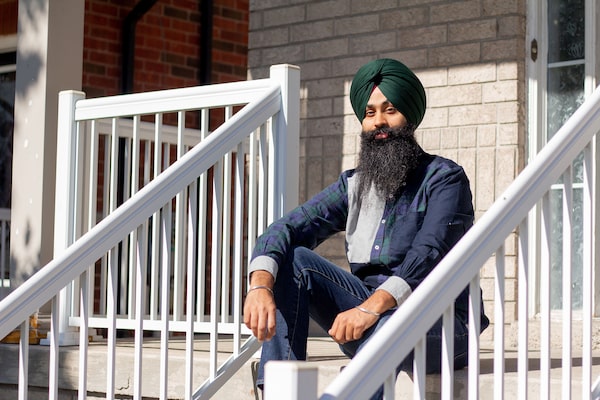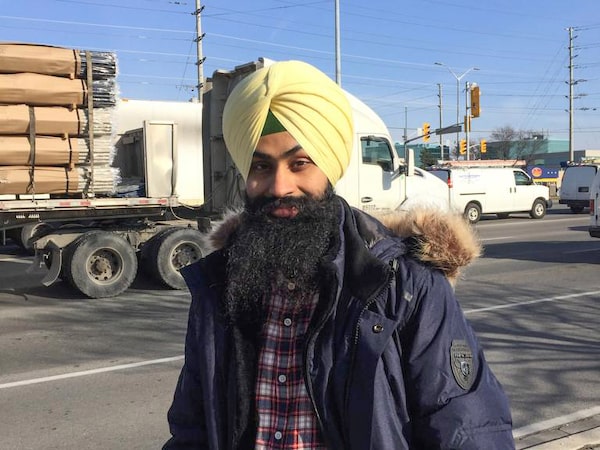
Arshdeep Singh Kang in his neighbourhood in Brampton, Ont., on Sept. 25, 2021.Baljit Singh/The Globe and Mail
When the freedom convoy was rolling into Canada’s capital this week, Arshdeep Singh Kang was more than 4,440 kilometres away in Los Angeles making a delivery.
The 30-year-old long-haul trucker followed the news of the convoy on his phone during rest stops, but he certainly had no desire to be part of it.
“I don’t believe in the issues they are raising,” Mr. Kang said. “I know there are some South Asian people who support this convoy, but I couldn’t see any of my people in the videos of the convoy.”
According to the 2016 census, South Asians comprise 18 per cent of all Canadian truckers. In major cities such as Vancouver and Toronto, they make up more than half the industry’s work force.
And yet many drivers such as Mr. Kang have no stake in the protest in Ottawa, even though its supporters have dubbed it a “truckers’ movement.”
Thousands of convoy protesters descend on Parliament Hill to demand an end to COVID-19 measures
Trucker convoy’s protest signs on Terry Fox statue in Ottawa spark outrage, donations to foundation
Jagroop Singh, the president of the Ontario Aggregate Trucking Association, said, “Nobody invited me or any South Asian truckers I know. In fact, we don’t even know who the organizers of this protest are. Nobody asked us if we agree with their demands.”
The convoy may have started as a protest against vaccine mandates, which some truckers say threaten their livelihoods, but it has now embraced several issues. It has drawn support from far-right and extremist groups, with one vlogger even saying he hoped it would become “Canada’s Jan. 6” – a reference to the deadly storming of the U.S. Capitol last year by a mob of Donald Trump supporters and right-wing groups. Many Ottawa residents and journalists have reported seeing Confederate flags in the convoy.

Mr. Kang, a 30-year-old long-haul trucker has no desire to be part of the freedom convoy.Supplied
Mr. Kang is a resident of Brampton, Ont., which is considered the heart of the trucking industry in the Greater Toronto Area. As of 2019, Brampton and surrounding Peel Region were home to approximately 2,000 trucking companies. But the convoy’s stand against vaccine mandates will find few supporters in the region, where 90 per cent of residents are double vaccinated as of Wednesday, and about 40 per cent have received booster shots.
Manan Gupta, the publisher of Road Today magazine, which caters to the South Asian trucking community in Canada, said “not only is there no anti-vaccine sentiment among South Asian truckers, but there is also an acute need to get vaccinated and boosted as soon as possible. Immigrant families in places like Brampton and Mississauga live in multigenerational families. A South Asian trucker doesn’t want to catch COVID, only to come back and infect the grandparents.”
Mr. Singh added, “I understand that mandates can be frustrating, but everyone should get vaccinated to protect their loved ones. We’ve encouraged all our members to get their shots as soon as possible. We’re even getting our kids vaccinated now.”
Ravish Garg, who regularly drives a Toronto-Chicago route, said, “I was hesitant at first, but I believe the experts. After getting my shots, I can drive carefree.”
Many of the freedom convoy’s supporters say they are not opposed to vaccines but to mandates. But Mr. Garg said opposing Ottawa’s rules won’t help. “Canada isn’t the only country in the world that has mandates. If you want to drive long-haul, you will have to enter the United States. And you can’t fight America’s vaccine mandate. It’s easier for everyone if we all just get the shot.”
Mr. Kang says the convoy may simply prove to be a distraction from some of the more systemic issues plaguing the trucking community. “They don’t stand for the issues that they should be standing for. Ask any trucker who drives through Western Canada or Northern Ontario how dangerous those roads are. There are hardly any rest stops. When you do find a place, there’s no parking,” he said.
Mr. Gupta said, “Northern Ontario has single-lane highways for trucks. Drivers have been demanding the twinning of highways for a very long time.”
While most South Asian drivers may not be taking part in the convoy, Brampton truckers are no strangers to protests. Mr. Kang was among the many agitating for better working conditions and fair wages last year. “Wage theft is a major issue across the trucking industry, not just in Brampton,” he said. “There are employers who don’t pay their drivers. These are the real issues we should all be uniting over, not vaccine mandates.”
Mr. Singh said trucking is an industry in crisis. “Inflation is hitting us hard. Drivers are quitting every day. Trucking companies are folding every day. The cost of trucking is increasing every day, but truckers are still expected to work at rates they were paid back in the 1980s. Trucking is becoming a tough business.
“If only we came together for the issues that are putting us out of business.”
A convoy of truckers and supporters protesting COVID-19 vaccine mandates to cross into the U.S. drove through Toronto on Thursday. The Canadian Trucking Alliance, which has denounced the protest, estimates that about 15 per cent of truckers, up to 16,000 people, are not fully vaccinated.
The Globe and Mail
Our Morning Update and Evening Update newsletters are written by Globe editors, giving you a concise summary of the day’s most important headlines. Sign up today.